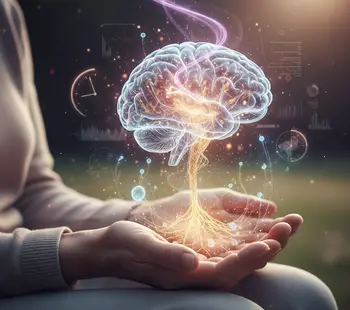- Home
- Brain Health
- Meditation and Memory
Meditation and Memory: How 10 Minutes Can Change Your Brain

In February 2025, researchers at Mount Sinai did something remarkable: they measured brain activity deep inside the hippocampus and amygdala while people meditated for the first time. Using electrodes already implanted in epilepsy patients, they captured what previous studies couldn't. The result: even complete beginners showed measurable changes in these memory and emotion centers within just ten minutes of practice.
This wasn't a surprise to neuroscientists who've been studying meditation for two decades. What made it significant was the directness of the measurement. We could finally see, in real time, what meditation does to the brain regions most critical for memory.
The connection between meditation and memory runs deeper than you might expect. When you meditate, you're not just relaxing. You're engaging in a practice that physically changes your brain's structure and function, in ways that directly support learning and recall. The research on this has grown remarkably strong over the past fifteen years.
What Happens in Your Brain When You Meditate
The brain changes from meditation fall into three categories: structural changes (your brain physically grows in certain areas), functional changes (activity patterns shift), and chemical changes (stress hormones drop). All three affect memory.
Your Hippocampus Actually Grows
The hippocampus is the brain region most associated with forming new memories. It's one of the few areas that continues generating new neurons throughout adulthood, a process called neurogenesis. And meditation appears to accelerate this growth.

A landmark 2011 study at Massachusetts General Hospital took MRI scans of people before and after an eight-week mindfulness program. Compared to a control group, the meditators showed increased gray matter density in the left hippocampus. These weren't lifelong monks. They were ordinary people who practiced an average of 27 minutes daily.
Sara Lazar, the Harvard neuroscientist who led this and related research, has found consistent results across multiple studies: meditation physically changes brain structure. Long-term meditators show larger hippocampal volumes than non-meditators. In one striking finding, 50-year-old meditators had the same amount of gray matter in their prefrontal cortex as 25-year-olds, suggesting meditation may slow typical age-related brain shrinkage.
Your Stress Response Quiets Down
Chronic stress is terrible for memory. The stress hormone cortisol, when elevated over long periods, literally damages the hippocampus and impairs your ability to form new memories. This is why you can't think straight when you're overwhelmed.
Meditation lowers cortisol. Research from UC Davis found that people who scored higher on mindfulness measures had lower resting cortisol levels, and those whose mindfulness increased after a meditation retreat showed corresponding decreases in cortisol. The effect builds over time: another study found that among experienced meditators, morning cortisol levels decreased with years of practice. The longer someone had been meditating, the lower their baseline stress hormone levels.
Meanwhile, the amygdala, your brain's fear and stress center, actually shrinks with regular meditation practice and becomes less reactive to triggers. This shift from chronic stress response to baseline calm creates better conditions for memory formation.
Your Attention Sharpens
Here's a simple truth about memory: you can't remember what you never noticed in the first place. Attention is the gateway to memory encoding. If you're distracted when information comes in, it never gets properly stored.
Meditation trains exactly this capacity. The core practice, noticing when your mind wanders and bringing it back, is essentially attention training. A 2024 meta-analysis of 111 randomized controlled trials (over 9,500 participants) found that mindfulness interventions produced significant improvements in attention, working memory accuracy, and sustained attention compared to control groups. The effect sizes were small to moderate but consistent across studies.
Working memory, your mental scratchpad for holding and manipulating information, seems particularly responsive to meditation training. A 2025 meta-analysis examining 43 studies with nearly 2,800 participants found a medium effect size (Hedges' g = 0.55) for mindfulness interventions on working memory, meaning the typical meditator performed better than about 70% of non-meditators on working memory tasks.
How Meditation Strengthens Memory: Four Mechanisms
Pulling together the research, meditation appears to improve memory through several overlapping pathways:
1. Growing your memory hardware. The hippocampus increases in gray matter density with regular practice. More neural real estate means more capacity for forming and storing memories. This isn't metaphorical; it shows up on brain scans.
2. Protecting your memory hardware. By reducing cortisol and chronic stress, meditation protects the hippocampus from damage. Stress literally kills neurons in this region. Meditation creates the biochemical conditions for neural preservation and growth.
3. Improving encoding efficiency. Sharper attention means information gets into your brain more effectively in the first place. You can't remember what you never properly noticed. Meditation strengthens the attentional "gateway" that allows experiences to become memories.
4. Enhancing working memory. The mental workspace where you hold and manipulate information improves with meditation practice. This affects everything from following conversations to solving problems to learning new skills.
Meditation and Cognitive Decline

Some of the most promising meditation research focuses on older adults and those experiencing early memory problems. Given our aging population, this has significant implications.
A 2025 systematic review and meta-analysis examined 25 randomized controlled trials involving over 2,000 participants with subjective cognitive decline, mild cognitive impairment, or Alzheimer's disease. Meditation significantly improved global cognitive performance, sleep quality, and overall health status in these populations.
One particularly well-studied technique is Kirtan Kriya, a simple 12-minute meditation involving finger movements and chanting. Research on older adults with subjective cognitive decline found that daily practice improved both how participants felt their memory was working and their actual performance on standardized cognitive tests. The benefits persisted at six-month follow-up.
Why might meditation be especially helpful for aging brains? Several reasons converge: it reduces the chronic stress that damages the hippocampus over decades. It may support neurogenesis. It strengthens attention and executive function, which naturally decline with age. And research suggests meditation may even protect telomeres, the caps on chromosomes that shorten as we age, with potential effects on cellular aging itself.
This doesn't mean meditation prevents dementia. The evidence isn't there yet for that claim. But it does appear to support cognitive function in populations already experiencing decline, which is meaningful.
High-Stress Performance
If meditation works in controlled studies, does it work in real life under pressure? A study by the University of Washington tested this by putting people through a realistic high-stress multitasking environment. Participants had to juggle answering phones, checking email, updating calendars, and sending text messages, simulating modern knowledge work.
Those who had completed meditation training outperformed the others in their ability to focus and stay on task. They also reported less stress during the exercise. This wasn't about being calmer; it was about performing better under pressure.
The practical implications are clear. Whether you're a student preparing for exams, a professional managing complex projects, or anyone who needs to remember information while juggling competing demands, meditation may give you an edge.
How Much Meditation Does It Take?
Here's the encouraging part: you don't need to meditate for hours daily or spend months in silent retreat. The research suggests meaningful benefits come from surprisingly modest practice.
The Massachusetts General study that showed hippocampal growth involved participants who meditated an average of 27 minutes per day for eight weeks. A study in Consciousness and Cognition found that even 20 minutes of daily meditation boosted performance on concentration and memory tests. The Mount Sinai study that opened this article found measurable brain changes in first-time meditators after just 10 minutes.
That said, more practice generally means more benefit. Long-term meditators show more pronounced brain changes than beginners. The stress-reducing effects deepen with years of practice. There's a dose-response relationship.
The sweet spot for most people seems to be somewhere between 15-30 minutes daily. Consistency matters more than duration. A short daily practice will likely benefit you more than occasional marathon sessions. The key is making it a habit, something you do regularly enough that the effects compound.
A Simple Practice to Start
The type of meditation most studied by Western researchers is mindfulness meditation, sometimes called awareness or insight meditation. It's straightforward and requires no special equipment or beliefs.
I practice seated breath meditation most mornings, usually 10-15 minutes. Eyes closed, counting breaths. Nothing exotic. When my mind wanders (it always does), I notice that and return to counting. That noticing, the moment you realize you've drifted, is actually the training. Each time you catch yourself and redirect, you're strengthening the neural pathways for attention and self-awareness.
Here's how to start:
1. Sit comfortably. A chair works fine. You don't need to contort yourself into a lotus position. Upright but relaxed posture helps you stay alert without straining.
2. Focus on your breath. Pay attention to the physical sensation of breathing: the air moving in and out, your chest or belly rising and falling. You're not trying to control your breath, just noticing it. Some people count breaths (I count down from 10, then start over).
3. Notice when your mind wanders. It will, constantly at first. This isn't failure; it's the whole point. The moment you notice you've drifted into thought is the moment of training.
4. Gently return your attention. Without judging yourself, bring your focus back to your breath. Then repeat. That's the entire practice.
If you want guidance, Giovanni Dienstmann's book Practical Meditation: A Simple Step-by-Step Guide is excellent. It covers multiple meditation styles in an accessible way and has been called "The Meditation Bible" for good reason. His website, LiveAndDare.com, offers free resources for getting started.
The Bottom Line
The link between meditation and memory is no longer speculative. Research consistently shows that meditation:
Increases gray matter in the hippocampus, the brain's memory center. Improves attention and working memory capacity. Reduces cortisol and protects against stress-related brain damage. May slow cognitive decline associated with aging.
The practice is free, requires no equipment, and can be done almost anywhere. Even brief daily sessions can produce measurable changes in brain structure and function. The main requirement is consistency: showing up to practice regularly, even when your mind feels restless.
For more on supporting your brain's memory capacity, see the Brain Health page, which covers how meditation fits alongside sleep, exercise, and stress management as part of a complete approach to cognitive health. For techniques to actually encode and retain specific information, see Memory Skills.
Important: This page provides general educational information about meditation and brain health. It is not medical advice. If you have concerns about cognitive decline, memory loss, or any medical condition, please consult a healthcare professional. See my Medical Disclaimer and Editorial Standards.
References & Research
I've reviewed these sources and selected them for their relevance to understanding how meditation affects memory. Here's what each contributes:
1. Maher, C., Tortolero, L., Jun, S., et al. (2025). "Intracranial substrates of meditation-induced neuromodulation in the amygdala and hippocampus." Proceedings of the National Academy of Sciences, 122(6), e2409423122. Free full text at PMC
Researcher's Note: This Mount Sinai study is remarkable for its methodology. By using electrodes already implanted in epilepsy patients, researchers could measure what happens in the hippocampus and amygdala during meditation, something impossible with standard brain imaging. Even first-time meditators showed increased gamma activity in these deep brain regions. The practical implication: meditation's effects aren't limited to experienced practitioners.
2. Hölzel, B.K., Carmody, J., Vangel, M., et al. (2011). "Mindfulness practice leads to increases in regional brain gray matter density." Psychiatry Research: Neuroimaging, 191(1), 36-43. Free full text at PMC
Researcher's Note: This is the landmark study that demonstrated meditation can physically grow your hippocampus. Using before-and-after MRI scans, researchers showed increased gray matter density in the left hippocampus after just eight weeks of mindfulness practice. The control group showed no such changes. This study fundamentally shifted how we think about meditation: it's not just subjective experience but measurable brain change.
3. Luders, E., Toga, A.W., Lepore, N., & Gaser, C. (2009). "The underlying anatomical correlates of long-term meditation: Larger hippocampal and frontal volumes of gray matter." NeuroImage, 45(3), 672-678. Free full text at PMC
Researcher's Note: This cross-sectional study compared long-term meditators to non-meditators and found significantly larger gray matter volumes in the right hippocampus and right orbito-frontal cortex. While cross-sectional studies can't prove causation (maybe people with larger hippocampi are drawn to meditation), combined with longitudinal studies like Hölzel's, the pattern strongly suggests meditation drives these changes.
4. Jacobs, T.L., Shaver, P.R., Epel, E.S., et al. (2013). "Self-reported mindfulness and cortisol during a Shamatha meditation retreat." Health Psychology, 32(10), 1104-1109. Free PDF at UC Davis
Researcher's Note: This study tracked cortisol levels during an intensive meditation retreat. As participants' mindfulness scores increased, their cortisol levels decreased proportionally. This provides mechanistic evidence for how meditation protects the brain: by reducing the stress hormones that damage the hippocampus over time.
5. Brand, S., Holsboer-Trachsler, E., Naranjo, J.R., & Schmidt, S. (2012). "Influence of mindfulness practice on cortisol and sleep in long-term and short-term meditators." Neuropsychobiology, 65(3), 109-118. Free full text at Research Gate
Researcher's Note: This study found that morning cortisol levels decreased with years of meditation practice: the longer someone had been meditating, the lower their baseline stress hormones. This suggests the stress-reducing benefits of meditation compound over time, building on each other with continued practice.
6. Zainal, N.H. & Newman, M.G. (2024). "Mindfulness enhances cognitive functioning: A meta-analysis of 111 randomized controlled trials." Health Psychology Review, 18(2), 369-395. Free full text at PMC
Researcher's Note: This is the most comprehensive meta-analysis to date on meditation and cognition, synthesizing 111 RCTs with over 9,500 participants. The findings are robust: mindfulness interventions produce significant improvements in attention, working memory accuracy, inhibition, and sustained attention. Effect sizes were small to moderate but consistent. This isn't cherry-picked studies; it's the weight of evidence.
7. Moradi, A., Ghorbani, M, et al. (2025). "The Effects of Mindfulness on Working Memory: A Systematic Review and Meta-Analysis." Mindfulness. Free full text on Research Gate
Researcher's Note: This very recent meta-analysis (2025) focused specifically on working memory, analyzing 29 studies with 2,000 participants across all age groups. The effect size (Hedges' g = 0.583) "confirm the effectiveness of mindfulness interventions in improving working memory." Working memory is crucial for everything from learning to problem-solving.
8. Shi, J., Tian, H., Wei, J., et al. (2025). "Meditation for subjective cognitive decline, mild cognitive impairment and Alzheimer's disease: a systematic review and meta-analysis of randomized controlled trials." Frontiers in Public Health, 13:1524898. Free full text at PMC
Researcher's Note: This 2025 meta-analysis examined 25 RCTs involving over 2,000 participants with cognitive decline or dementia. Meditation significantly improved global cognitive performance, sleep quality, and overall health. For an aging population concerned about cognitive decline, this is highly relevant evidence that meditation may be a useful intervention.
9. Innes, K.E., Selfe, T.K., Khalsa, D.S., & Kandati, S. (2017). "Meditation and Music Improve Memory and Cognitive Function in Adults with Subjective Cognitive Decline." Journal of Alzheimer's Disease, 56(3), 899-916. Free full text at PMC
Researcher's Note: This study tested Kirtan Kriya, a simple 12-minute meditation, in older adults with subjective cognitive decline. Both meditation and music listening improved memory and cognitive function, with benefits persisting at six-month follow-up. The meditation is accessible: it involves finger movements and simple sounds, making it easy to learn and practice.
10. Jacobs, T.L., Epel, E.S., Lin, J., et al. (2011). "Intensive meditation training, immune cell telomerase activity, and psychological mediators." Psychoneuroendocrinology, 36(5), 664-681. Free full text at Science Direct
Researcher's Note: This study found that meditation retreat participants showed increased telomerase activity compared to controls. Telomerase maintains telomeres, the protective caps on chromosomes that shorten with age. While the long-term implications are still being studied, this suggests meditation may affect biological aging at the cellular level.
11. Levy, D.M., Wobbrock, J.O., Kaszniak, A.W., & Ostergren, M. (2012). "The Effects of Mindfulness Meditation Training on Multitasking in a High-Stress Information Environment." Proceedings of Graphics Interface 2012, 45-52. PDF from University of Washington
Researcher's Note: This study tested meditation in a realistic work environment: juggling phones, email, calendars, and messages. Meditators outperformed controls on focus and task-switching, with less stress. This matters because it shows meditation benefits transfer from the cushion to real-world performance under pressure.
12. Zeidan, F., Johnson, S.K., Diamond, B.J., et al. (2010). "Mindfulness Meditation Improves Cognition: Evidence of Brief Mental Training." Consciousness and Cognition, 19(2), 597-605. Free full text at Science Direct
Researcher's Note: This study showed cognitive improvements after just four days of brief meditation training (20 minutes daily). Participants improved on tasks requiring sustained attention and working memory. The practical takeaway: you don't need months of practice to start seeing benefits. Even brief training can enhance cognitive function.
Published: 12/08/2011
Last Updated: 01/11/2026

Newest / Popular
Multiplayer
Board Games
Card & Tile
Concentration
Math / Memory
Puzzles A-M
Puzzles N-Z
Time Mgmt
Word Games
- Retro Flash -
Also:
Bubble Pop
• Solitaire
• Tetris
Checkers
• Mahjong Tiles
•Typing
No sign-up or log-in needed. Just go to a game page and start playing! ![]()
Free Printable Puzzles:
Sudoku • Crosswords • Word Search

Hippocampus? Working memory? Spaced repetition?
Look up memory or brain terms in the A-Z glossary of definitions.





